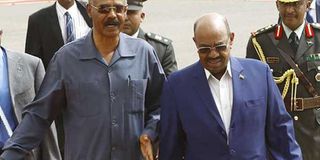No experts on the future; they’d have told us that Afwerki smiles

Eritrea’s Isaias Afwerki (left) and Sudanese President Omar Al-Bashir. PHOTO | FILE | AFP
What you need to know:
- In October 2015 John Pombe Magufuli got elected in Tanzania.
- He was a “little man” who experts had told us little about, until after he had “fallen into things” as the good people of Uganda would say.
- The Kenyan Supreme Court, in the ultimate shocker, overturned the election result.
Ma Yun, known more commonly as Jack Ma, the Chinese billionaire who co-founded technology conglomerate Alibaba, last year kicked off a big debate when he said; “When faced with the future, we’re all kids; no one’s an expert”.
Now there are millions of professional reputations, whole forecasting industries, billions of dollars in stocks based on the assumption that companies can “see” the future, so a statement like that cannot be left to go quietly.
Ma was talking about things like artificial intelligence, and whether technology would replace humans, not more prosaic things like bread, butter, beer and ugali.
Yet, even in more earthly things, looking around the regions neighbouring East Africa, we must doubt whether there are any experts left – especially in politics.
MAGUFULI
The list is long, so we shall pick a few. In October 2015 John Pombe Magufuli got elected in Tanzania.
He was a “little man” who experts had told us little about, until after he had “fallen into things” as the good people of Uganda would say. And no one really told us he would go so hard against corruption.
There’s this view that because of Tanzania founding father Julius Nyerere’s austere ways and socialism, once he left and the country embraced the tempting ways of a market economy, ruling CCM stalwarts were focused on “catch up on eating”, and corruption would reign for many years to come.
So Magufuli was really a breath of fresh air. However, a few leaders around Africa have fought corruption, so some of us had heard the story before. What was unexpected was that Magufuli would also be against wasteful expenditure, and would cancel even “small” things like government Christmas cards. Africa’s anti-corruption leaders, generally still like to live in palaces.
BRASS KNUCKLES
Then, while we were coming to terms with Magufuli’s anti-graft ways, he wore brass knuckles and imposed the most repressive rule the country has ever seen. Strongmen and autocrats are dime a dozen in Africa.
In Magufuli’s case, however, it was like rescuing someone from hell, so you can murder them in heaven. It didn’t add up.
Then it was Kenya’s turn to surprise. In September last year, following an acrimonious presidential contest, opposition leader Raila Odinga went to court to challenge the declaration of President Uhuru Kenyatta as winner.
ULTIMATE SHOCKER
The Kenyan Supreme Court, in the ultimate shocker, overturned the result, becoming the first court in Africa to nullify the re-election of a sitting president. You would say, well, why do challengers in Africa go to courts if they don’t expect them to overturn presidential elections.
Fact is presidential petitions are like prayers. When you go to church and pray to God to help overcome difficulties like poverty and illness, you don’t expect that you will go home and find a sack full money under your bed, or that your high blood pressure will disappear when you go for communion.
Generally, you expect relief and comfort, and the strength to fight and overcome over a long period.
HANDSHAKE
And while Kenya was still consumed by one of its worst wave of post-election acrimony, in March Uhuru and Raila show up one morning, pull off their famous handshake, hug, pat each other on the back, and just like that they were BFFs (best friends forever). To this day, there are people who haven’t go over the shock – or disappointment.
To be fair, critics were alleging in 2017 that the Raila camp was playing for “half a loaf” in government by way a national unity. But that still fell far short of the handshake scenario.
Then, up north, there was Ethiopia. To start with, in February Hailemariam Desalegn resigned as prime minister. What was that? In East Africa proper, the joke was that he had been be-witched.
ETHIOPIA
Then, two months later, the ruling Ethiopian Peoples’ Revolutionary Democratic Front (EPRDF), the closest you get to a Stalinist party on these streets, elected the youthful Abiy Ahmed as prime minister.
He was an Oromo, a long-oppressed majority that had never tasted power in Ethiopia. He released prisoners, supped with the opposition, made peace with arch enemy Eritrea and followed up with a visit to Asmara. Eritrea’s reclusive autocrat Isaias Afwerki responded in kind, and also visited Addis Ababa.
We were all surprised to see Afwerki cracking jokes, hugging, and smiling.
We didn’t know that he knew how to do any of those things. But the biggest surprise of all was that a leader with liberal democratic instincts was hiding in the EPRDF!
Mr Onyango-Obbo is publisher of Africapedia.com and explainer Roguechiefs.com. Twit-ter@cobbo3




